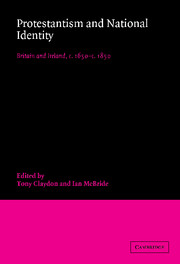Book contents
- Frontmatter
- Contents
- List of contributors
- Acknowledgements
- List of abbreviations
- Introduction
- England
- Britain and Ireland
- 6 The British dimension, religion and the shaping of political identities during the reign of Charles II.
- 7 The bible and national identity in the British Isles, c.1650–c.1750
- 8 Protestantism, presbyterianism and national identity in eighteenth-century Scottish history
- 9 Protestantism, ethnicity and Irish identities, 1660–1760
- 10 ‘The common name of Irishman’: protestantism and patriotism in eighteenth-century Ireland
- Britain, Ireland and the world
- Index
10 - ‘The common name of Irishman’: protestantism and patriotism in eighteenth-century Ireland
Published online by Cambridge University Press: 16 October 2009
- Frontmatter
- Contents
- List of contributors
- Acknowledgements
- List of abbreviations
- Introduction
- England
- Britain and Ireland
- 6 The British dimension, religion and the shaping of political identities during the reign of Charles II.
- 7 The bible and national identity in the British Isles, c.1650–c.1750
- 8 Protestantism, presbyterianism and national identity in eighteenth-century Scottish history
- 9 Protestantism, ethnicity and Irish identities, 1660–1760
- 10 ‘The common name of Irishman’: protestantism and patriotism in eighteenth-century Ireland
- Britain, Ireland and the world
- Index
Summary
Although Linda Colley's Britons does not deal explicitly with John Bull's other island, its central thesis is of great importance for Irish historians. Neither the protestant triumphalism nor the cult of the British constitution which she describes were confined to Great Britain: they constituted the ideological co-ordinates of the protestant ascendancy in Ireland between 1690 and 1800, and of the various forms of settler ‘nationalism’ which challenged the imperial administration during that period. This common British heritage was transformed by the peculiarities of the Irish situation, however, producing a different pattern from that found in England or Scotland. Whig political culture was skewed by the inferior status of the Dublin parliament, while the anti-catholicism of the ascendancy was sharpened by the close proximity and numerical strength of‘the other’.
Until recently, scholars of eighteenth-century Ireland have largely ignored British and imperial perspectives, operating instead within an insular context. In the last century a canon of patriotic writings was constructed which began with William Molyneux and skipped forwards to Jonathan Swift, Charles Lucas, Henry Grattan, before culminating in Wolfe Tone. The period of legislative autonomy between 1782 and 1801– popularly known as ‘Grattan's parliament’– served as an inspiration for repealers and home rulers, while the more radical form of patriotism which surfaced in the 1790s was used to legitimise republican separatism. Over the last twenty-five years the nationalist interpretation has come under heavy fire, but revisionists have failed to generate an alternative set of organising principles.
- Type
- Chapter
- Information
- Protestantism and National IdentityBritain and Ireland, c.1650–c.1850, pp. 236 - 262Publisher: Cambridge University PressPrint publication year: 1998
- 5
- Cited by



